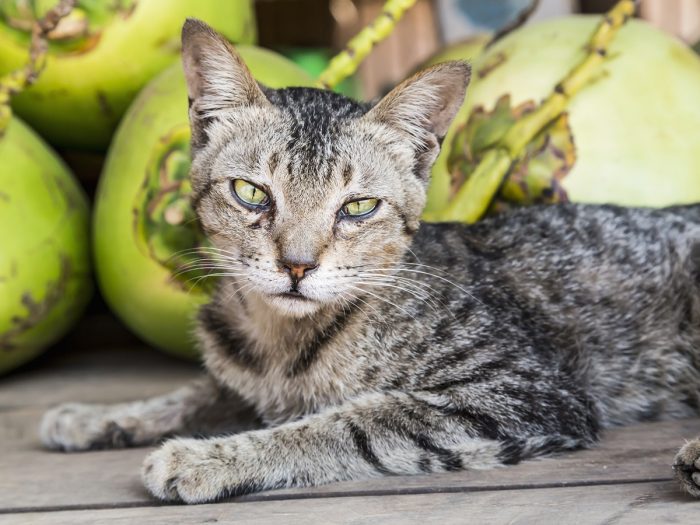Coconut oil can have many benefits for cats, including the ability to clear up skin conditions, soothe allergies, improve immune health, reduce inflammation throughout the body, and improve digestive issues. Pet owners who give their cats coconut oil are doing their feline friends a favor, provided they apply or give coconut oil in a healthy amount, and consider other potential health complications or risks.
Coconut oil has become very popular in health care in recent decades, but its benefits have been well known around the world for centuries, particularly in tropical locales where coconuts actually grow. Coconut oil is particularly rich in medium-chain fatty acids, unlike the long-chain fatty acids typically found in vegetables. These MCFAs are very good for the body, because they are small and can be absorbed by cell membranes relatively easily, and are not difficult to digest. The saturated fat content is a red flag for some people, but the body actually needs some of these “good” fats for optimal health. Furthermore, coconut oil is rich in other nutrients, such as vitamin E and vitamin K, as well as lauric acid and capric acid. While cats don’t use nutrients in precisely the same way as humans, they can still derive numerous benefits from this healthy oil. [1]
Coconut Oil Benefits for Cats
Some of the benefits of coconut oil for cats include the following:
Skin Care
In cases of dry, irritated skin or psoriasis, coconut oil can be very good for cats. Simply rub a small amount of the oil on the inflamed area and let the fatty acids and antioxidants within the oil work their magic. [2]
Relieves Digestive Issues
As a laxative and anti-inflammatory substance, coconut oil can help cats who are suffering from constipation, painful hard stools, or a bacterial infection in their gut. Coconut oil is known to prevent the development of such infections in humans and other animals, while also improving nutrient absorption in the gut. [3]
Reduces Inflammation
Some cats have to deal with arthritis as they get older, just like humans, but coconut oil’s anti-inflammatory nature can help ease that pain and increase mobility, while also boosting their metabolism and energy levels. [4]

A cat posing for a close-up picture. Photo Credit: Shutterstock
Prevents Allergic Reactions
Coconut oil has a positive effect on the immune system, which also makes cats less likely to suffer from an allergic reaction. By optimizing the immune system and increasing defenses against viral and bacterial pathogens, coconut oil helps prevent “misfires” by the immune system, also known as allergic reactions,
Eliminates Hairballs
While hairballs aren’t necessarily a medical condition, they are still an annoyance to your pet, and to you as their owner! A small amount of coconut oil in their diet can help reduce any inflammation in their respiratory tracts and lower their incidence of coughing up hairballs! [5]
How to Include Coconut Oil in Your Cat’s Diet?
When adding coconut oil to your cat’s diet or applying it to their skin, start with very small amounts, to ensure that the cat is not allergic to the substance. Apply a small amount to your finger and let your cat lick it off. If your pet seems to like it, and shows no signs of a reaction within 2-3 hours, add 1/8 teaspoon of coconut oil to their food, or coat one of their toys in the oil. Cats tend to like the taste, but if not, mixing it into their food may be the best means of delivery. For an adult cat, no more than 1/2 teaspoon should be given per day, and most people keep the dose at about 1/4 teaspoon. [6]
Topically, you can simply rub your finger in the oil and then apply it to the affected area of skin (where there may be irritation, or where the fur is looking patchy). Expect your cat to lick at the area, since they do like the taste, but this isn’t a bad thing. The coconut oil will begin to soak into the skin immediately, and do its work, while the oil your cat licks off will give it some internal benefits. For treating certain conditions, like the reduction of hairballs, much smaller and less frequent doses of this oil are required.
Remember, coconut oil is still rich in fat, and does have a notable amount of calories, so if you want your active, slim cat to stay that way, be sure not to add too much of this oil to their diet. If you notice rapid weight gain, avoid giving them coconut oil every day and ensure they have enough activity in their day.
Side Effects of Coconut Oil for Cats
Aside from the risk of your cat gaining weight, other side effects of coconut oil can include upset stomach, diarrhea, and even pancreatitis. This high-calorie and high-fat health treat is good for the reasons outlined above, but excess medium-chain fatty acids can cause inflammation in the pancreas, which is never a good thing. Upset stomach and diarrhea can occur when an excess of this oil is eaten. It acts as a laxative in humans and cats, so eating too much will result in messy accidents around your house. [7]
Allergies to this particular oil are quite rare, but it is still something to take into consideration. That is why starting with small amounts and working your way up is recommended. If your cat vomits, has trouble breathing, stops eating, or has a more violent gastrointestinal reactions, stop using this oil immediately.
